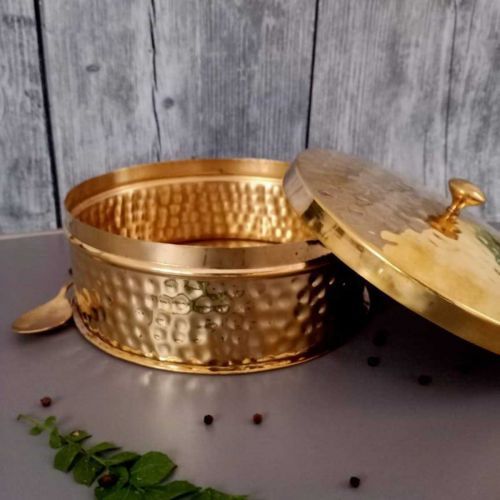SAMA Homes
Brass Roti Box Large Without Tin Coating (Roti -Chapati Dabbha from Jandialaguru)
Brass Roti Box Large Without Tin Coating (Roti -Chapati Dabbha from Jandialaguru)
20 in stock
Couldn't load pickup availability
The Roti Dabba comes without the Tin coating and based on discussion with few expert artisans and grandmother's they have been deemed safe for use.
From 400 families who used to practice this craft, the number has dwindled to a meagre 15
Brass also helps in preserving more than 90% of nutrition of food cooked in them. Brass also retains heat and keep food warm for a couple of hours.
SKU:SH-ZA-BRL05
❓ Have a specific question?
From shipping to sustainability, we have answers. Check our FAQ →
You Might Also Like in Brass Storage Container
Explore Related Categories
- Brand: View all SAMA Homes Products
- Category: See more Brass Kitchen Storage Containerss
- Collection: Browse Brass Storage Container
- Collection: Browse Kitchenware
- Collection: Browse Premium Brass and Copper Spice Boxes, Daal Boxes and Kitchen Storage Containers
- Collection: Browse Premium Kitchen Essentials – Mortars, Belan & Cooking Tools | Sama Homes
- Collection: Browse Sama Homes' Brass Collection
Browsing our catalog of 16,000+ authentic items. View Full Catalog.





Brass Utensils: A Sustainable Kitchen Choice
Brass, an alloy of copper and zinc, offers a surprisingly eco-friendly option for a variety of household items. Here's how brass contributes to a more sustainable lifestyle. Looking for ways to green your kitchen? Consider brass utensils! These beautiful and functional tools offer surprising sustainability benefits.
Collapsible content
Benefits of Brass Utensils
- Long-lasting Durability: Brass is a robust metal that can last for generations with proper care. Unlike disposable or flimsy utensils, brass stands the test of time, reducing waste and the need for frequent replacements.
- Reduced Landfill Impact: By choosing durable brass, you divert utensils from landfills, contributing to a cleaner environment.
- Natural Antibacterial Properties: Brass possesses inherent antibacterial properties, which can be beneficial, especially for frequently used cooking tools.
- Heat Conductivity: Brass conducts heat efficiently, ensuring even cooking and potentially reducing cooking times, which can save energy.
How Brass Utensils Reduce Your Carbon Footprint
- Lower Production Footprint: Compared to virgin materials, recycled brass requires less energy to produce, leading to lower greenhouse gas emissions.
- Less Waste, Less Transportation: Durable brass utensils minimize the need for frequent replacements, reducing waste generation and the environmental impact of transportation for new products.
- Multi-generational Use: Brass utensils can be passed down through families, further reducing the need for new production and its associated carbon footprint.
Sustainable Considerations
- Tin Lining: For acidic foods, choose tin-lined brass utensils. The lining protects food from reacting with the brass and prevents metallic taste. Unlined brass is best for dry goods or non-acidic foods.
- Proper Care: Handwashing and occasional polishing keep brass utensils looking their best and extend their lifespan, maximizing their sustainability value.
Embrace a Greener Kitchen
By incorporating brass utensils into your kitchen routine, you're not just adding a touch of elegance, you're making a conscious choice for a more sustainable future. So, ditch the disposables and embrace the beauty and longevity of brass!





